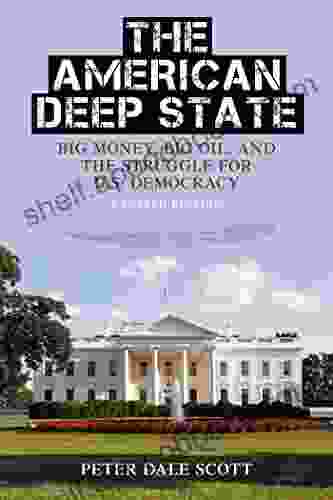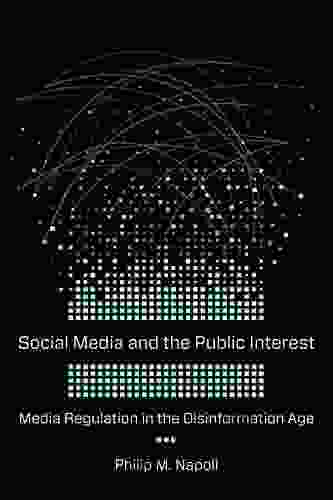Unveiling the Impact: Social Media and the Public Interest

In today's rapidly evolving digital landscape, social media has emerged as an transformative force, shaping the way we communicate, access information, and engage with the world around us. Amidst the myriad of benefits it offers, a crucial question arises: how does social media impact the public interest?
This comprehensive 3000-word article delves into the multifaceted relationship between social media and the public interest, exploring its potential for good as well as the challenges it poses.
The Power of Social Media for Public Good
Social media platforms have become a powerful tool for amplifying voices, connecting people from diverse backgrounds, and fostering collective action. Whether it's organizing protests, raising awareness for social justice issues, or providing a platform for marginalized communities, social media has played a significant role in shaping public discourse and driving social change.
4.2 out of 5
| Language | : | English |
| File size | : | 1014 KB |
| Text-to-Speech | : | Enabled |
| Screen Reader | : | Supported |
| Enhanced typesetting | : | Enabled |
| Word Wise | : | Enabled |
| Print length | : | 296 pages |
One of the most notable examples of social media's positive impact on the public interest is its role in organizing grassroots movements. During the Arab Spring, platforms like Facebook and Twitter enabled activists to mobilize and coordinate protests against authoritarian regimes, leading to widespread political change in several countries.
Social media has also become an invaluable tool for disaster relief and emergency response. During natural disasters, real-time updates, crowd-sourced information, and community support on social media platforms have helped save lives, connect victims with resources, and coordinate relief efforts.
Challenges and Concerns for the Public Interest
While social media offers immense potential for public good, it also poses a number of challenges and concerns. One of the most pressing issues is the spread of misinformation and disinformation. False and misleading information disseminated on social media can undermine trust in institutions, polarize society, and have harmful real-world consequences.
Another concern is the erosion of privacy. Social media companies collect vast amounts of data on their users, including their personal information, browsing history, and social interactions. This data can be used to manipulate users, target advertising, and potentially violate their privacy rights.
Furthermore, the addictive nature of social media can have negative effects on mental health and well-being. Excessive use can lead to feelings of anxiety, depression, and social isolation, as well as interfere with work, relationships, and sleep.
Striking a Balance: Regulating Social Media in the Public Interest
The challenges posed by social media demand careful consideration and regulation to ensure that its benefits outweigh its potential harms. Striking a balance between protecting the public interest and preserving freedom of expression is essential.
Regulators and policymakers have a crucial role to play in establishing clear guidelines and implementing measures to address misinformation, protect privacy, and promote responsible use of social media. This may include requiring platforms to label false information, increasing transparency around data collection, and supporting media literacy initiatives.
The Way Forward: Empowering Individuals and Society
Addressing the challenges and harnessing the potential of social media for the public interest requires a multi-faceted approach involving social media companies, policymakers, and individuals.
Social media companies must prioritize transparency, accountability, and ethical practices. They should invest in measures to combat misinformation, safeguard user privacy, and promote responsible use of their platforms.
Policymakers have a responsibility to establish clear regulations, enforce antitrust laws, and foster competition in the social media industry. By promoting a level playing field, they can prevent monopolies and ensure that the public interest is not sacrificed for private profit.
Finally, individuals have a vital role to play in shaping the impact of social media on the public interest. Critical thinking, media literacy, and responsible use are essential for navigating the digital landscape and mitigating its potential harms. By being mindful of our online behavior and supporting organizations working to promote a healthy and equitable digital environment, we can contribute to a social media landscape that serves the public good.
The impact of social media on the public interest is complex and multifaceted, presenting both opportunities and challenges. By fostering collective action, amplifying marginalized voices, and facilitating disaster response, social media has the potential to be a powerful force for good.
However, concerns about misinformation, privacy erosion, and mental health require thoughtful regulation and responsible use. Social media companies, policymakers, and individuals must work together to strike a balance that protects the public interest while preserving freedom of expression.
By empowering individuals, encouraging ethical practices by social media companies, and implementing effective regulations, we can harness the potential of social media for the benefit of society and ensure that it serves as a tool for progress, social change, and the promotion of the public good.
4.2 out of 5
| Language | : | English |
| File size | : | 1014 KB |
| Text-to-Speech | : | Enabled |
| Screen Reader | : | Supported |
| Enhanced typesetting | : | Enabled |
| Word Wise | : | Enabled |
| Print length | : | 296 pages |
Do you want to contribute by writing guest posts on this blog?
Please contact us and send us a resume of previous articles that you have written.
 Book
Book Novel
Novel Page
Page Chapter
Chapter Text
Text Story
Story Genre
Genre Reader
Reader Library
Library Paperback
Paperback E-book
E-book Magazine
Magazine Newspaper
Newspaper Paragraph
Paragraph Sentence
Sentence Bookmark
Bookmark Shelf
Shelf Glossary
Glossary Bibliography
Bibliography Foreword
Foreword Preface
Preface Synopsis
Synopsis Annotation
Annotation Footnote
Footnote Manuscript
Manuscript Scroll
Scroll Codex
Codex Tome
Tome Bestseller
Bestseller Classics
Classics Library card
Library card Narrative
Narrative Biography
Biography Autobiography
Autobiography Memoir
Memoir Reference
Reference Encyclopedia
Encyclopedia Wesley K Clark
Wesley K Clark Donald Miller
Donald Miller Yan Artime
Yan Artime Peter Pomerantsev
Peter Pomerantsev John E Douglas
John E Douglas R Bruce Mcbride
R Bruce Mcbride Don S Browning
Don S Browning Sarah Mccarry
Sarah Mccarry Domingo Morel
Domingo Morel Donna Douglas
Donna Douglas Louisa George
Louisa George Ernest Stambouly
Ernest Stambouly Troy Tradup
Troy Tradup Gill Thompson
Gill Thompson Dorothy H Cohen
Dorothy H Cohen Richard Kagan
Richard Kagan Dimitri A Bogazianos
Dimitri A Bogazianos Henry Rollins
Henry Rollins Donald A Crosby
Donald A Crosby Sunday Cummins
Sunday Cummins
Light bulbAdvertise smarter! Our strategic ad space ensures maximum exposure. Reserve your spot today!

 Arthur MasonThe Blackmailer Guide to Love: A Literary Tapestry of Passion, Betrayal, and...
Arthur MasonThe Blackmailer Guide to Love: A Literary Tapestry of Passion, Betrayal, and... Jaime MitchellFollow ·9.4k
Jaime MitchellFollow ·9.4k Dylan MitchellFollow ·18.9k
Dylan MitchellFollow ·18.9k Jesse BellFollow ·9.9k
Jesse BellFollow ·9.9k Joshua ReedFollow ·4.9k
Joshua ReedFollow ·4.9k Ralph TurnerFollow ·19.3k
Ralph TurnerFollow ·19.3k Gregory WoodsFollow ·18.4k
Gregory WoodsFollow ·18.4k Ted SimmonsFollow ·6.8k
Ted SimmonsFollow ·6.8k Roger TurnerFollow ·19.7k
Roger TurnerFollow ·19.7k

 Larry Reed
Larry ReedBig Money, Big Oil, and the Struggle for Democracy
By [Author's Name] In this...

 Jackson Blair
Jackson BlairUnleash Your Creativity with The Ultimate Guide to Cricut...
Welcome to the extraordinary world of Cricut...

 Glen Powell
Glen PowellTo the American Public: Uncovering the Hidden Truths and...
An Incisive and Urgent Call to...

 Bryce Foster
Bryce FosterUltimate Guide to Starting a Mini Food Truck Business:...
: Embracing the Mobile Culinary...

 John Steinbeck
John SteinbeckHow To Make Different Styles Of Flute From Around The...
Embark on a...
4.2 out of 5
| Language | : | English |
| File size | : | 1014 KB |
| Text-to-Speech | : | Enabled |
| Screen Reader | : | Supported |
| Enhanced typesetting | : | Enabled |
| Word Wise | : | Enabled |
| Print length | : | 296 pages |












